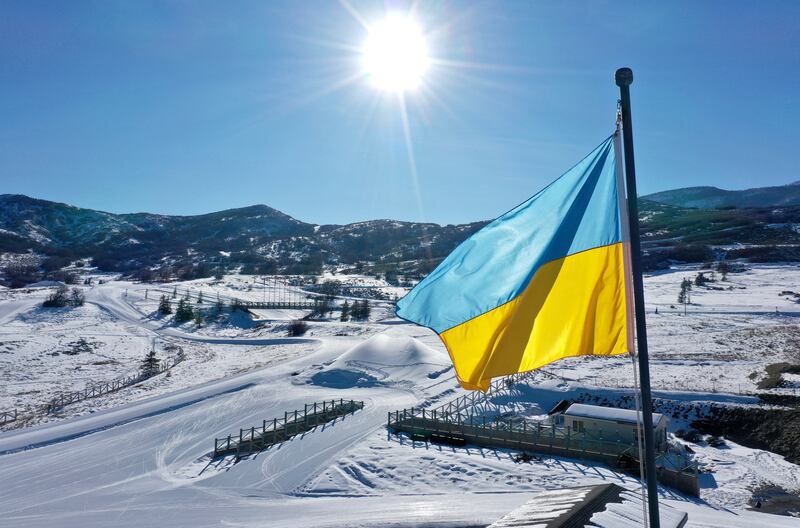The International Olympic Committee called Monday for athletes from Russia and Belarus, the countries involved in the ongoing invasion of Ukraine, to be barred from competing, a recommendation quickly endorsed by backers of Utah’s bid for another Winter Games.
“In the spirit of world peace, we stand behind decisions by the International Olympic Committee and international sports federations,” said Fraser Bullock, president and CEO of the Salt Lake City-Utah Committee for the Games that’s bidding on behalf of the United States for the 2030 or 2034 Winter Games,
“The tragedies in the conflict in Ukraine have a far-reaching impact,” Bullock said.
A team of eight Russian athletes ages 18-21 is currently competing in Utah at the 2022 International Biathlon Union’s Youth and Junior World Championships that started before the invasion and ends Wednesday at Soldier Hollow in Midway, an Olympic venue during the 2002 Winter Games.
The IBU decided Saturday the Russian team members would have to finish the competition as “neutral” athletes, unable to display any symbols of their country, including their flag or national anthem. The new rules in place for the rest of the season also apply to Belarusian athletes, although none are competing at the Soldier Hollow event.
So far, none of the Russian athletes have medaled in any events, but should they make it to the podium, the IBU flag and anthem would be used during the ceremony. At the 2022 Winter Games in Beijing, Russian athletes also competed without their flag or anthem as part of a penalty for doping.
Ukraine did not send any athletes to the competition and is not planning to participate in any future events this season, but their nation’s blue and gold flag is flying atop the competition management building at the event’s finish line and will be flown at future events as a show of solidarity, the sports federation said.
Bullock, who attended the biathlon junior world cup Saturday, said he “saw the flag of Ukraine flying proudly above the competition and it did my heart a lot of good to see that. Because all of our hearts go out to the people of Ukraine.”
He said there “was a lot of discussion” at the event about what was happening in Ukraine.
The IOC has already condemned Russia’s breach of the Olympic Truce adopted last December by the United Nations General Assembly that is not set to end until a week after the closing ceremonies of the 2022 Paralympics in Beijing on March 13, and called for sporting events planned for Russia and Belarus to be moved or canceled.
The truce, which dates back to the origins of the Olympics in ancient Greece, is typically adopted before each Games to uphold what the IOC described as the Olympic movement’s “mission to contribute to peace through sport and to unite the world in peaceful competition beyond all political disputes.”
Russia’s ongoing invasion of Ukraine, with the assistance of neighboring Belarus, has pushed the IOC’s executive board to go further and urge Russian and Belarusian athletes be barred from competing internationally, citing the war’s impact on Ukrainian athletes.
The decision to target athletes from Russia and Belarus was taken “with a heavy heart,” the IOC leaders said in a statement, justifying their recommendation as necessary “in order to protect the integrity of global sports competitions and for the safety of all the participants.”
The statement said the IOC “reaffirms its full solidarity with the Ukrainian Olympic Community. They are in our hearts and thoughts” and “commits to continue and strengthen its efforts for humanitarian assistance,” including establishing a solidarity fund to assist Ukrainian athletes and their families.
Following the IOC’s announcement, Russia was suspended from international soccer competition, including upcoming World Cup matches. Poland had already refused to play Russia in a qualifying match in March for one of Europe’s spots in the final tournament being held in Qatar.
The IOC also withdrew its highest honor, the Olympic Order, from Russian President Vladimir Putin and two other Russian officials. Putin was heavily involved in the organizing of the 2014 Winter Games in Sochi, a summer resort city in Russia.
Ukraine is among the countries that have expressed interest in hosting a future Winter Games to help turn a mountain region there into the Alps of Eastern Europe. Other bidders include Salt Lake City; Sapporo, Japan; Vancouver, Canada; and Barcelona, Spain, along with the Pyrenees Mountain region.
Under a new, less formal bidding process, the IOC is in talks with interested cities and countries with no set date to award the 2030 Winter Games. A decision is anticipated sometime this year and could include naming a host for the 2034 Winter Games at the same time.
“The courage of the people of Ukraine is inspiring,” Bullock said. “Our hopes and prayers are with them, that they can overcome this tremendous challenge and conflict so they can resume hopes of participating in sporting events — and hosting sporting events — long into the future.”


